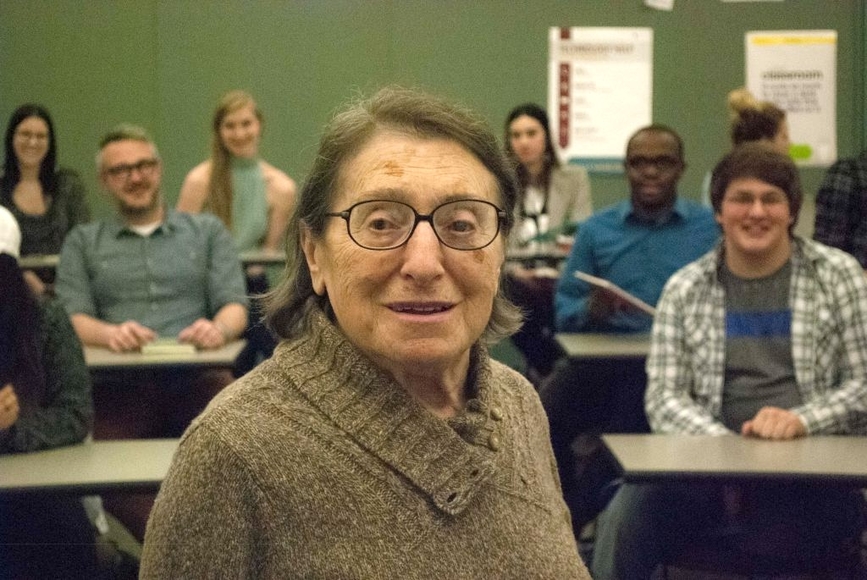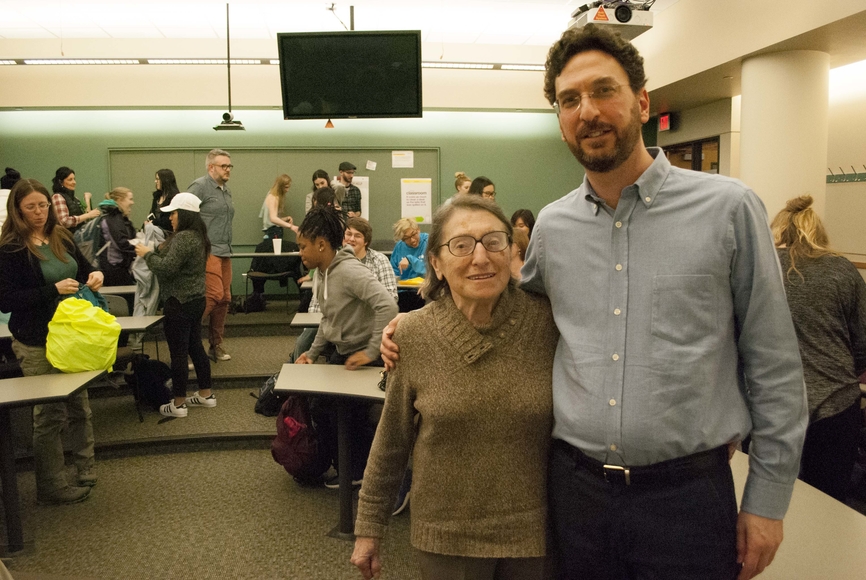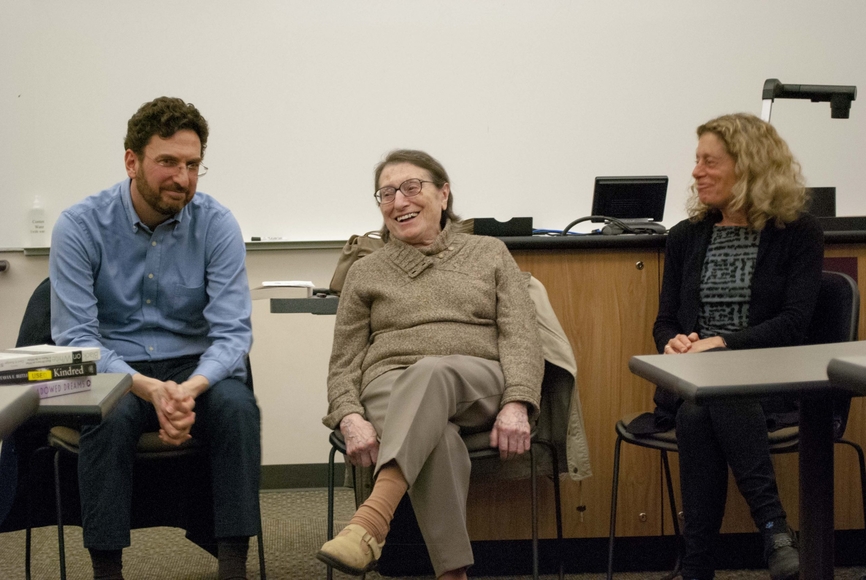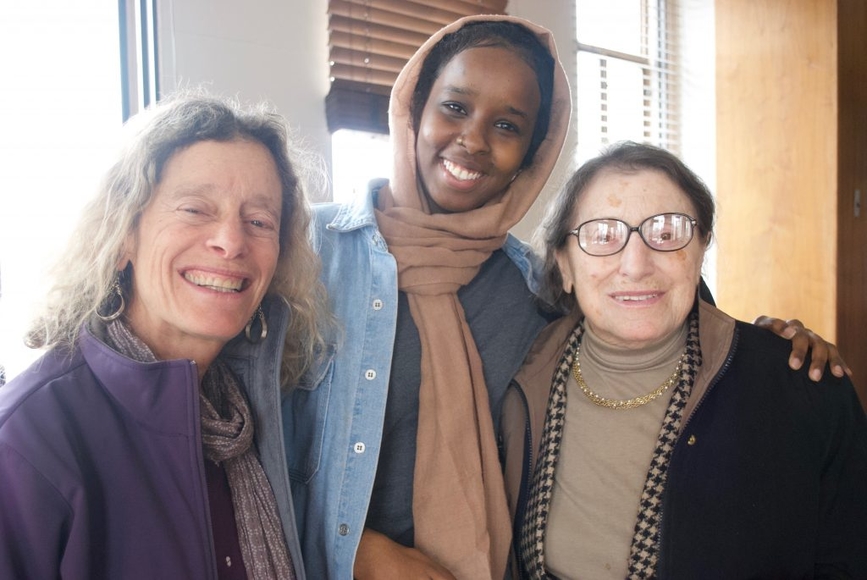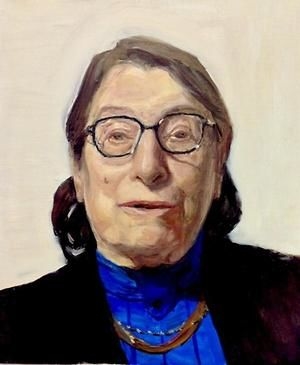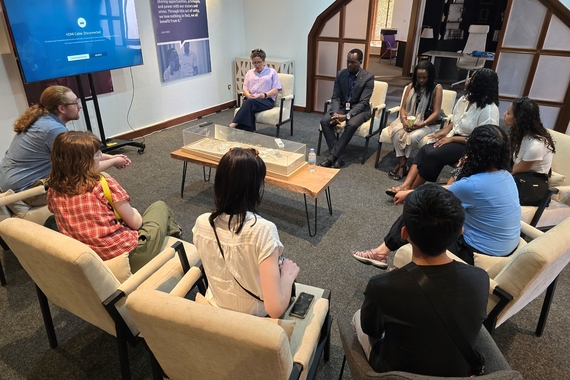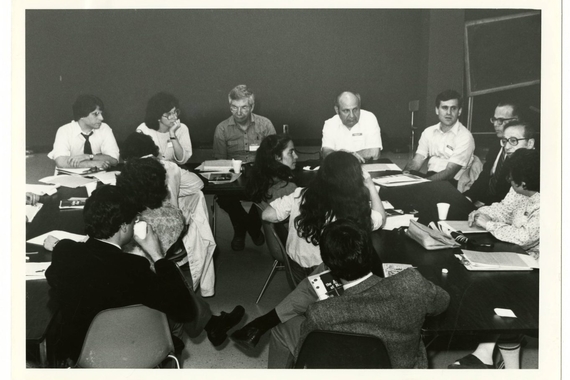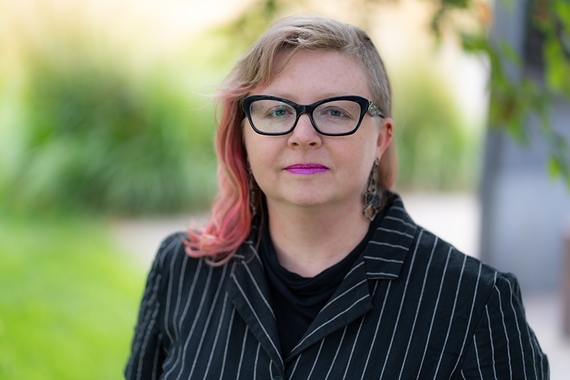The Center for Holocaust & Genocide Studies learned of the recent passing of UMN alumna and volunteer Dora Zaidenweber (MA '52, economics). Dora Eiger Zaidenweber was born on January 24, 1924, in Radom, Poland. She remembers Germany’s invasion of Poland as being “like something you would see in a movie, but never think would happen to you.” In 1941, Dora and her family were forced into the ghetto where she met her husband Jules Zaidenweber. Dora was later transported to Auschwitz before being evacuated on a forced march to Bergen-Belsen. She was liberated on April 15, 1945, and later reunited with Jules, her father, and brother. The Zaidenwebers settled in Minnesota in 1950. Dora was among the center’s earliest supporters when it was founded in 1997.
Dora has always believed in speaking about her experiences and has educated many young people, teachers, and individuals about the Holocaust. If there is a lesson in the Holocaust, Dora believed it was that if you do nothing and ignore the persecution of others, you are no different than those who perpetrate the crimes. Even this last spring, Dora found time to testify at a Minnesota Senate committee hearing on Holocaust education and a class here at the University.
Student Reflections
“I enjoyed listening to every single part of your story, to me you are a strong woman, a true warrior. I couldn’t stop thinking about my family and my own mother, your strength is unbelievable. Thank you for letting us know that in moments like the ones we are going through today, we more than ever need to be loud and resist!! On my way back home I couldn’t stop thinking about your experience in Auschwitz. As an immigrant in the United States, I know what it’s like to feel unwelcomed, and although there are times I feel like some things are impossible, your story has motivated me to keep fighting and striving for the better of our community.”
“I went home and I cried that day. Hearing your story and processing it was difficult for me. But despite that, I’m thankful for having this memory passed on to me. I strongly believe that the best way to combat darkness in our world is to confront it, not avoid it. If we can be strong enough to do that then we can then use it against itself through education. That’s what you’ve done, and that’s the lesson I hope everyone took away from your visit.”
“I thank you endlessly for coming to our class. Sometimes in academia, it’s hard to remind yourself that people truly and wholly suffered at the hands of other people. Studying the Holocaust and genocide is one thing—being faced with a personal story, hearing real emotion, having actual experience is an entirely new realm of learning. I will never forget your presentation, you have left me with so much to think about, and truly struck my soul with your words.”
Former CHGS Director Reflections
Sharing his memories of Dora, former CHGS director Alejandro Baer writes:
“One of my favorite memories of the UMN is when, after Dora and Rosanne spoke in the lecture hall, we went to the CHGS library room with whoever wanted to come from the class. Here, the students conversed with Dora over tea and cookies, shared something about themselves, and the shyer ones opened up. Dora listened carefully and asked about their career paths and backgrounds (“So you are an immigrant like myself!” she once said to a Somali student).
"Dora also had a wonderful sense of humor. Since I am soft-spoken and she had severe hearing difficulties, the comical situations were always served. I remember emailing home a picture of one of those warm and animated moments when students circled Dora with bright and smiling faces. My mom replied the next day: “You look so happy,” she wrote. Indeed, I am very fortunate to have had the chance to connect Dora and Rosanne with students over the years. Those visits and conversations profoundly impacted them, as they did on me. Thank you, dear Dora, and hasta siempre.”
Faculty Reflections
Dr. Hassan Abdel Salam often invited Dora to speak to her class. He shares:
“Dora was a shining light. I asked her—begged her—to come to several of my classes. She was the highlight of my human rights classes. Dora came to several classes as a guest lecturer in a course entitled Global Islamophobia. One of the goals of the course is to examine the links and similarities between antisemitism and Islamophobia. Dora’s presentations were memorable because of her presence—her indomitable spirit expressed through her warmth, sincerity, and deep-seated decency. Students are mesmerized by her first-hand accounts of genocide, the stories of her family in Europe, her struggles when she arrived in Minnesota after the Holocaust, and her continued activism to deepen her understanding of the Holocaust. I remember my students’ captive attention, the many questions one after the other, the flower one student brought, and the feeling that our mere togetherness in class was a stand against hatred and bigotry.
The last class she attended was last semester in the spring 2023 semester. I would tell students that Dora was a co-instructor of the course. I will miss her. I feel an emptiness that I cannot ask Dora to come to class. I will miss Dora’s laughter and warmth—and the feeling of solace I get from listening to her instructive and inspiring stories. Despite enduring great struggles and suffering, her warmth, charisma, and effortless generosity persist. I hope to continue to learn from Dora and that her influence endures in my students and my continued instruction and work to achieve greater understanding and kindness despite our differences. For now, I grieve the loss of my co-instructor.“
Listen to Dora Zaidenweber's Testimony
The Center for Holocaust & Genocide Studies has collected a number of Dora’s memories, which are available to listen to through our digital collections, including testimonies from Dora and her late husband, Jules, and her interview with Felix de la Concha for the Portraying Memory project.
